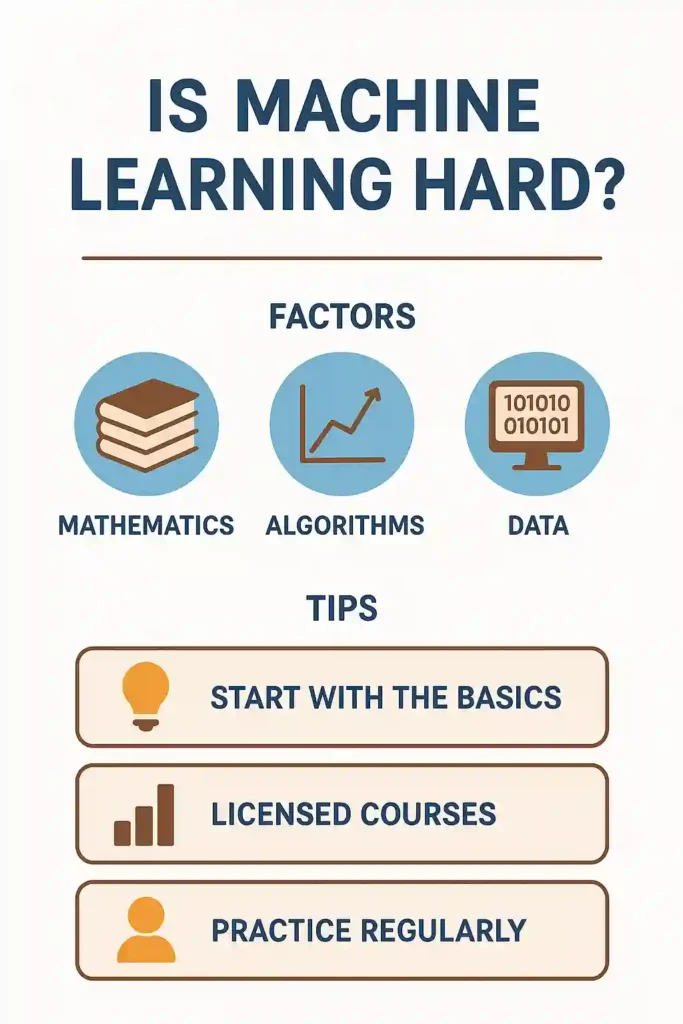If you’ve ever wondered, “Is Machine Learning Hard?”, you’re not alone. Many people look at machine learning (ML) and immediately imagine complex math equations, scary algorithms, and endless coding. But here’s the truth: while machine learning can feel challenging at first, it’s far from impossible — and with the right approach, it can even be fun, rewarding, and life-changing.
In this expert-guided article, you’ll learn what actually makes machine learning difficult (or easy), how beginners can start strong, how long it really takes to learn, and why millions of people switch to ML careers with confidence every year.
We’ll use everyday language, real examples, anecdotes, and a step-by-step guide so that anyone can understand — even if you have zero technical background.
- Quick Summary
- Why People Often Ask: “Is Machine Learning Hard?”
- Is Machine Learning Hard Reddit: What Real Learners Say
- Is Machine Learning Hard for Beginners: A Simple Step-by-Step Roadmap
- Is Machine Learning Harder Than Software Engineering?
- Is Machine Learning Fun? Absolutely — and Here’s Why
- Is Machine Learning Harder Than Data Science?
- Is Machine Learning Worth It? (Here’s the Honest Answer)
- Is Deep Learning Hard?
- How Long Does It Take to Learn Machine Learning?
- So… Is Machine Learning Hard? Final Expert Opinion
- Ready to Start Learning Machine Learning with Confidence?
- FAQ: Common Questions About Learning Machine Learning
Quick Summary
- ML is not “hard,” but it does require patience and practice.
- The most difficult part is knowing where to start — not the concepts themselves.
- Anyone can learn ML if they move step-by-step with the right resources.
- A structured roadmap and real projects matter more than math genius.
- ML offers high-paying careers, exciting projects, and long-term job security.
Why People Often Ask: “Is Machine Learning Hard?”
Let me tell you a short story.
A few years ago, a friend of mine — a marketing professional with no coding experience — decided to learn machine learning because he wanted to analyze customer data more effectively. He always said, “I’m terrible at math. ML is not for someone like me.” But after two months of consistent learning, he built a small model that predicted which customers were most likely to buy again.
His reaction?
“I can’t believe I thought ML was rocket science. It’s just learning a new language.”
Stories like this prove that machine learning feels hard only until you take the first small step.
Is Machine Learning Hard Reddit: What Real Learners Say
Online communities like Reddit give surprisingly honest insights. If you browse threads such as Machine Learning subreddit, you’ll find a common theme:
- ML is hard without guidance, but manageable with structure
- Projects make ML easier than theory
- Consistency beats talent
One Redditor wrote:
“ML was confusing for months. Then everything clicked after I built my first real model.”
This perspective matters: beginners aren’t failing because ML is impossible—they’re failing because they start without a roadmap.
Is Machine Learning Hard for Beginners: A Simple Step-by-Step Roadmap
Many beginners make ML harder than it needs to be. Here’s a proven, beginner-friendly roadmap.

Step 1 — Learn Basic Python
Python is the easiest entry point. Start with the basics from
https://docs.python.org/3/tutorial/
Step 2 — Understand Core ML Concepts
Begin with simple, intuitive topics from
https://en.wikipedia.org/wiki/Machine_learning
Focus on:
- Supervised learning
- Unsupervised learning
- Regression
- Classification
Step 3 — Work With Simple ML Libraries
Start hands-on using:
- scikit-learn
- NumPy
- Pandas
Step 4 — Build Mini-Projects
Some easy project ideas:
- House price prediction
- Spam email classifier
- Movie review sentiment analysis
Step 5 — Study a Bit of Math (Only When Needed)
Use accessible explanations from
https://www.khanacademy.org/math
Step 6 — Keep Learning Gradually
Learning ML is like learning guitar: you get better one session at a time.
Is Machine Learning Harder Than Software Engineering?
Many people compare ML with software engineering (SE). Here’s the simple truth:
- Software engineering is about building systems.
- Machine learning is about learning patterns from data.
SE can be harder for people who dislike debugging or structure.
ML can be harder for people who dislike math or experimentation.
A great comparison is available here:
https://en.wikipedia.org/wiki/Software_engineering
But one thing is certain: neither field requires being a genius. It’s about learning progressively.
When people ask is machine learning hard, it also helps to look at the advantages of machine learning, because knowing its benefits makes the learning journey feel more meaningful and easier to follow.
Is Machine Learning Fun? Absolutely — and Here’s Why
Many learners say ML feels like magic. You give the computer data, and it learns on its own.
Try running a simple model that predicts tomorrow’s temperature or detects fake reviews — it feels strangely satisfying.
In fact, the fun grows when you explore:
- Neural networks
- Natural language processing
- Computer vision
Watching your model make real-world decisions is incredibly rewarding.
Is Machine Learning Harder Than Data Science?
People often mix up the two. Here’s a clean distinction:
- Data science → analyzing data
- Machine learning → building predictive models
Data science involves more statistics and business insights.
Machine learning involves more algorithms and modeling.
A helpful comparison reference:
https://en.wikipedia.org/wiki/Data_science
Is one harder? Not really — they simply focus on different goals.
Is Machine Learning Worth It? (Here’s the Honest Answer)
Yes — machine learning is absolutely worth it, especially today.
Here’s why:
✔ High salaries
See salary data here:
https://www.glassdoor.com/Salaries/machine-learning-engineer-salary-SRCH_KO0,25.htm
✔ Long-term career security
ML is used in:
- Healthcare
- Finance
- Tech
- E-commerce
- Automotive
- Cybersecurity
✔ You can build useful real-world tools
From recommendation engines to AI chatbots — ML skills allow you to create solutions people actually need.
✔ Remote-friendly work opportunities
ML jobs are widely available across the world.
Is Deep Learning Hard?
Deep learning is an advanced part of ML focused on neural networks.
Learn more here:
https://en.wikipedia.org/wiki/Deep_learning
Yes, it’s more complex than basic ML, but thanks to libraries like
- TensorFlow → https://www.tensorflow.org/
- PyTorch → https://pytorch.org/
You can build powerful models with surprisingly simple code.
How Long Does It Take to Learn Machine Learning?
The timeline depends on your effort, but here’s a realistic breakdown:
1–2 Months:
Basics of Python, ML foundations, small projects.
3–6 Months:
Intermediate projects, data cleaning, model evaluation, ML pipelines.
6–12 Months:
Deep learning, NLP, computer vision, and deployment.
A structured approach speeds things up dramatically.
So… Is Machine Learning Hard? Final Expert Opinion
No — machine learning isn’t hard, but it requires guided effort.
And once you get past the first few weeks, it becomes one of the most exciting skills you’ll ever learn.
“Machine learning rewards curiosity. The more you explore, the more powerful it becomes.”
— Dr. Pedro Domingos, Author of “The Master Algorithm”
Ready to Start Learning Machine Learning with Confidence?
If you’ve read this far, you already have something most people lack: interest. And that’s the biggest advantage.
With the right tools, structured guidance, and consistent practice, you can confidently learn ML — even if you’re a complete beginner.
This is the perfect time to invest in yourself, explore this field, and step into a career full of growth and possibilities.
FAQ: Common Questions About Learning Machine Learning
1. How difficult is it to learn machine learning?
Machine learning isn’t “hard,” but it does require consistent effort. The real challenge isn’t the concepts — it’s knowing where to start. If you follow a step-by-step path (learn basic Python → understand core ML ideas → build small projects), it becomes much easier. Most learners say the first few weeks feel confusing, but once you build your first model, everything starts to make sense. With patience, practice, and the right resources, anyone can learn machine learning.
2. Is machine learning harder than coding?
Machine learning and coding are different skills. Basic coding focuses on telling a computer exactly what to do. Machine learning focuses on teaching the computer to learn from data. Some people find ML easier because many libraries do the heavy lifting. Others find ML harder because it involves thinking in a new way. But in reality, if you know basic Python, ML isn’t harder — it’s just more experimental and creative.
3. Is machine learning full of math?
Machine learning does include math, but you don’t need to be a math expert to start. You can learn most beginner and intermediate ML topics with only basic knowledge of algebra and simple statistics. The deeper math (like calculus and linear algebra) becomes important later, especially for deep learning or research roles. For everyday machine learning tasks, tools like scikit-learn, TensorFlow, and PyTorch handle most of the math for you.
4. Is ML a high-paying job?
Yes, machine learning is one of the highest-paying fields in the tech industry. ML engineers, data scientists, and AI specialists often earn salaries above many traditional software roles. Companies pay well because machine learning helps them improve products, make smarter decisions, and automate work. With the rise of AI, the demand for ML skills is growing fast, making it a strong career choice with long-term earning potential.

